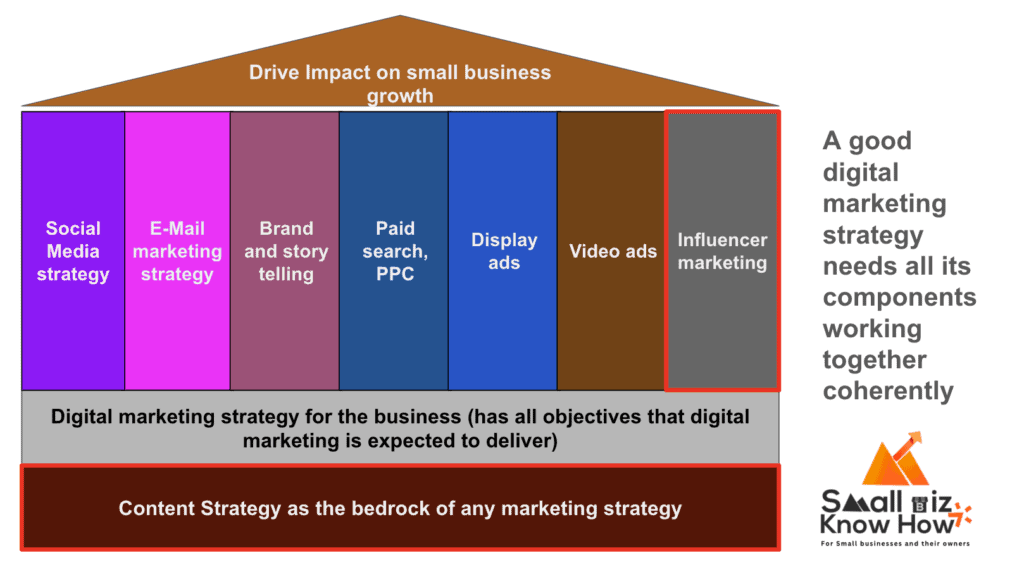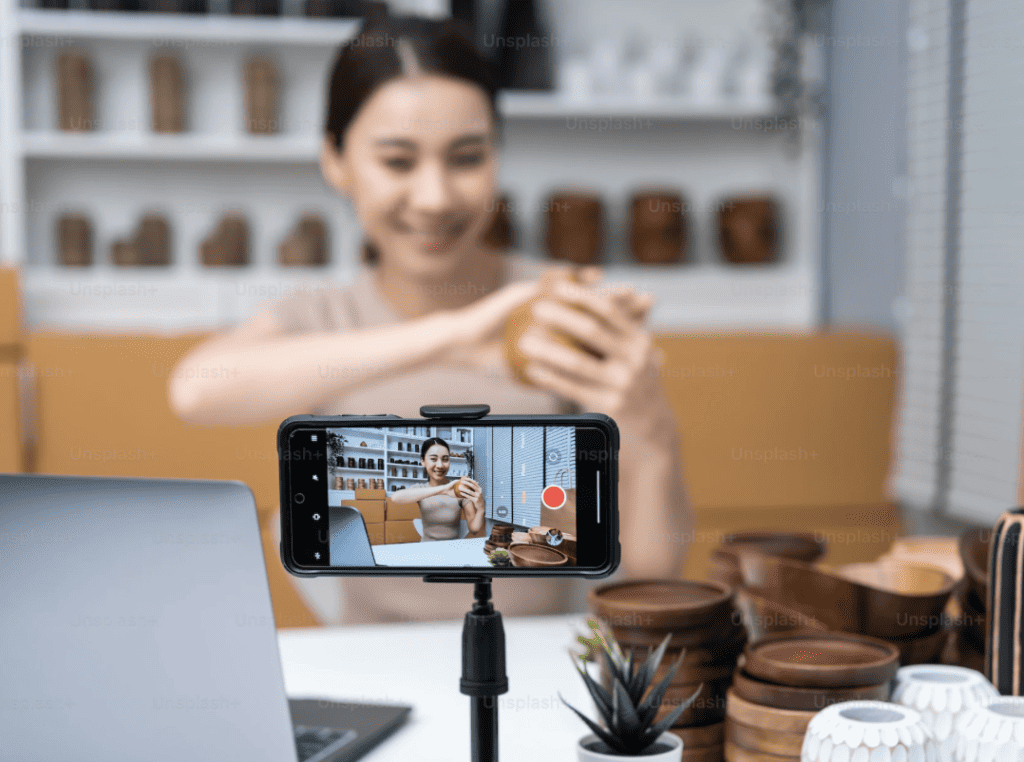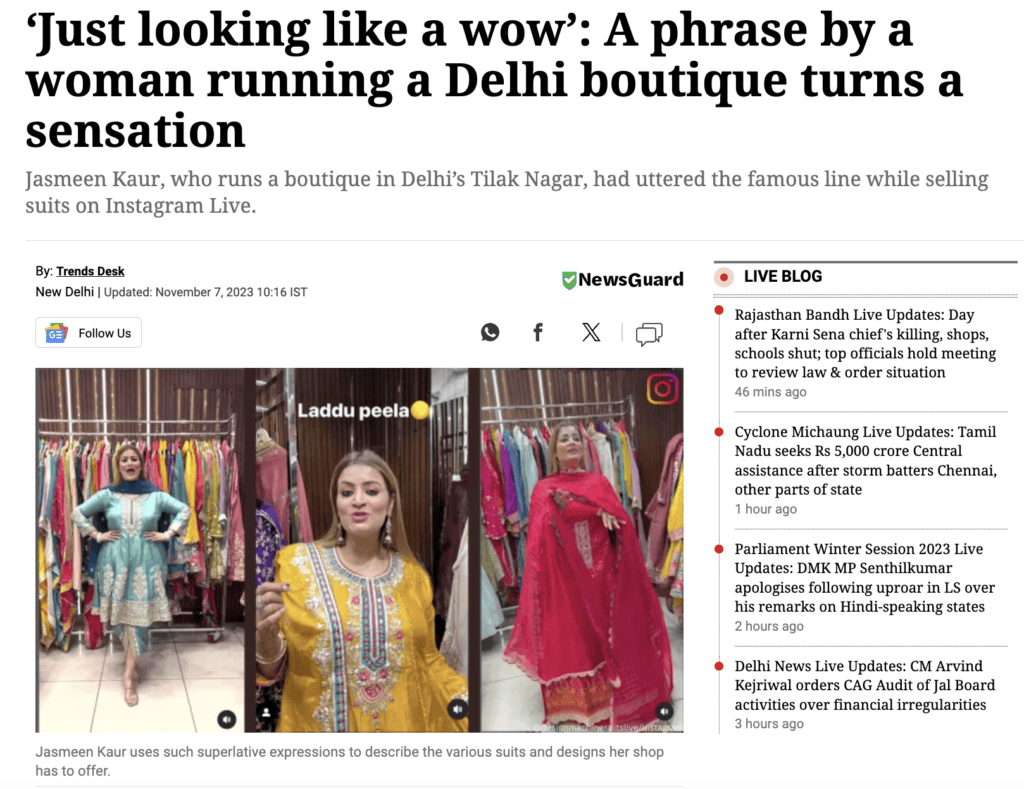I have worked with many small businesses over my decade plus experience in solving for small business growth challenges. During this period, I have seen a lot of enthusiasm from small business owners for investing in digital marketing campaigns to get leads and try and improve sales.
However, not many of them are gung-ho about influencers and the benefit their business can get by partnering with influencers.
Influencer marketing is a digital marketing plan for small businesses where a business can tap into the existing audience of a content creator on a social media platform. The content creator is also an influencer since the audience he or she has often actively follow their advice and suggestions, making it a quick win for the partnering business to get prospective customers. Influencer marketing is especially useful for a business that is selling direct to consumers.

Lets look at what small business owners should know about influencer marketing before they can adopt some practices into their overall marketing journey.
What is influencer marketing for small businesses? How can a small business work with an influencer to grow their brand?
Influencer marketing is an effective strategy as a part of any digital marketing plan for small businesses aiming to enhance their brand visibility and building an audience on social media. By collaborating with influencers, small businesses can leverage the influencers’ established audience and credibility to introduce and promote their products or services. This type of marketing involves partnering with popular social media personalities or influencers who resonate with the small business’s target audience.
Influencer marketing offers a cost-effective way to reach potential customers for small businesses. Unlike traditional marketing methods, which can be costly and less targeted, working with an influencer allows for a more direct and authentic engagement with a specific audience.
Influencers, with their following, can introduce a small business’s brand to a new and already engaged audience. This marketing strategy is not just about reaching more people; it’s about reaching the right people through trusted influencers. Its a direct and easy way to build trust for a new brand with a new audience.

When a small business collaborates with an influencer, it’s essential to ensure that the influencer’s values and audience aligns with the business’s target market. The influencer can create content that showcases the business’s products or services in a way that feels natural and genuine. This could be through social media posts, blog articles, or videos. The authenticity of the influencer’s content can significantly influence consumer behavior, as followers often value the influencer’s opinions and recommendations.
Influencer marketing can provide valuable insights into customer preferences and trends, as influencers often receive direct feedback from their followers. Small businesses can use these insights to adapt their products, services, and overall marketing strategy.
Additionally, influencer partnerships can boost a brand’s social media presence, increasing brand awareness and potentially leading to higher sales. This will also help organic visibility to a brand’s social media pages over time as the audience spill over happens.
Influencer marketing is a powerful tool for small businesses. By partnering with the right influencers, these businesses can reach a broader and more targeted audience, gain valuable insights, and enhance their brand’s reputation.
Once influencers share their authentic experiences with a brand, they can significantly sway their followers’ purchasing decisions, leading to growth and success for the small business. There are many instances of small businesses that have launched themselves with influencers to become much bigger companies and some of them have evn gone onto becoming publicly listed companies.
The rise of influencers in promoting a brand on social media platforms

WIth the increase in penetration of video based social media platforms, there has been a steady rise in the number of global, local and micro influencers across multiple marketing platforms. People who began as content creators have evolved into influencers when people have started taking their opinions and views seriously.
Who is an influencer?
Now for the small business owner who is wondering, who the heck is an influencer? Why are they so important? so on and so forth lets jump in.
A person is recognised as an influencer when he or she has a loyal following across multiple social media platforms. The audience follow an influencer for advice, recommendations and make key decisions based on what influencers have to say.
Influencers build this kind of a relationship with their audience through the content they create. The content they create can be educational, inspirational or things like reviews and recommendations if an influencer is an expert in the niche.
Basically, an influencer is very well known in a specific niche, for example, in the digital marketing niche for small businesses, Neil Patel is a well known influencer. Ramit Sethi is another influencer who is popular in the personal finance Niche. Gary Vaynerchuk is another popular influencer in the media space.

The benefit for small businesses who leverage influencers is that you will get someone else to promote you to an established and receptive audience. This amplifies all that you have done before and can your marketing efforts more legs to go the distance.
What is the difference between a content creator and an influencer?
Who is a content creator?
A content creator is someone who primarily focuses on producing and sharing media content, such as videos, blogs, photography, or podcasts. Their primary goal is to create engaging, informative, or entertaining content. Content creators may have a specific skill set or area of expertise, such as cooking, technology, fashion, or education.
They might use various marketing or social media platforms like YouTube, blogs, Instagram, or TikTok to showcase their work. The emphasis is more on the quality, originality, and creativity of the content rather than on the creator’s personal influence or authority.
Who is an influencer?
An influencer, on the other hand, is someone who has the power to affect the purchasing decisions of others because of their authority, knowledge, position, or relationship with their audience. Influencers typically have a large and engaged following on social media platforms.
Their influence is often based on the trust and rapport they have built with their audience. Influencers might collaborate with brands to promote products or services to their followers, using their credibility to sway their audience’s opinions and behaviors.
While influencers certainly create content, their primary role is more focused on marketing and promotion, often leveraging their personal image and lifestyle to engage with their audience.
Why is influencer marketing an important piece of digital marketing strategy?
There are broadly 5 reasons why influencer marketing is an important pillar of any digital marketing strategy.

Influencer marketing drives more organic engagement
Influencer marketing has become a cornerstone in modern digital marketing strategies, offering unique advantages in a rapidly evolving online landscape. This approach leverages the credibility and reach of influencers, individuals who have amassed significant followings on social media platforms, to promote products or services. Influencer marketing stands out for its ability to connect brands with audiences in a more organic and engaging manner compared to traditional advertising.
Influencer marketing takes advantage of a trust based relationship
Basically, influencer marketing taps into the trust that influencers have built with their audience. When an influencer recommends a product, their followers are more likely to perceive it as a genuine endorsement, not just an advertisement. This trust-based relationship is a key reason why influencer marketing can be more effective than traditional marketing approaches in certain contexts. Influencers, being skilled content creators, often present products in a context that resonates with their audience, making the marketing effort seem less intrusive and more relatable.
Influencer marketing can target specific Niches
Another critical aspect of influencer marketing is its ability to target specific niches. Influencers often have a well-defined audience demographic, making it easier for brands to reach particular segments with their marketing messages. This targeted approach can lead to higher engagement rates and better ROI compared to broader, less personalized marketing strategies.

Social Proof is best targeted using Influencer marketing
Basically, influencer marketing harnesses the power of social proof. When potential customers see an influencer using or endorsing a product, it acts as a social cue, encouraging them to try the product themselves. This is particularly potent in today’s digital world, where purchasing decisions are heavily influenced by opinions shared on social media.
Influencer marketing offers versatility
Influencer marketing also offers versatility in content creation. Influencers, being adept content creators, can produce a variety of content formats—from Instagram posts to YouTube videos—that can attract and engage diverse audiences. This versatility allows brands to leverage different types of content to keep their marketing strategy fresh and appealing.
As the digital marketing landscapes evolve, the role of influencers in marketing strategies is likely to grow to become more significant. This makes influencer marketing an indispensable tool for small businesses with brands looking to thrive online and build a connect with potential customers.
What are important factors to keep in mind when a small business explores influencer marketing?

There are broadly 5 factors that all small businesses who want to market using influencers should keep in mind. Getting these included in your terms with influencers will save a lot of heart burn later on. In my experience, a few small businesses I know have tried working with influencers but when few factors dont align, the whole experience can become unpleasant for both the business and the influencer.
Remember that most influencers are also small business owners who are trying to make a living, so think of it like a partnership for joint benefits rather than looking at influencers like a marketing agency who are supposed to give you some hard results.
The factors to be kept in mind are
- Audience Match – It’s crucial to choose influencers whose audience align with your business’s target audience. This ensures that your efforts to promote your products or services reach the right people. Basically the influencer’s audience should have interests that overlap with what your business offers. I would also strongly recommend business owners use from free tools to filter out ‘bots’ or fake audiences that an influencer may report to inflate their size of audience.
- Budget Considerations – Influencer marketing doesn’t always have to be expensive. Small businesses should consider both paid and unpaid collaborations. While paid partnerships can guarantee a certain level of promotion, unpaid collaborations, like product gifting, can also be effective, especially with local or less-known influencers who are looking to grow their own following.
- Brand Awareness Goals – Influencer marketing can help boost brand awareness on social media and similar marketing platforms. By working with influencers, small businesses can promote their brand story and values to a wider audience. This helps in creating a strong brand image and increasing visibility in the market.
- Authenticity – The partnership between influencers and small businesses should feel natural and authentic. Influencers who genuinely like your product or service will create more authentic content, which resonates better with their audience. Authentic promotions are more likely to convert followers into customers.
- Social Commerce Opportunities– Basically, social commerce is becoming increasingly important. Influencers can drive direct sales through social media platforms. By leveraging their reach, small businesses can promote their products in a way that integrates seamlessly with the shopping features of platforms like Instagram or Facebook, making it easier for customers to make purchases directly through social media. Look at establishing mutually beneficial relationships through these social commerce opportunities
Are there any influencer marketing guidelines from regulators that small businesses need to know?

There are several guidelines from advertising regulators such as the FTC and EASA that cover some important factors while collaborating with influencers. I am covering the top 5 guidelines that small businesses must be aware of. As a business owner, you must visit the respective agency website to understand the details for your region.
- Disclosure of Sponsorships – Influencers must clearly disclose any kind of relationship they have with a brand, including sponsorships, free products, or any form of compensation. This is to ensure that the audience is aware of any potential biases. The disclosures should be clear and conspicuous, not hidden away in hashtags or at the end of a long post. Its typical for influencers to add a lot of hasgtags in the post to reach a larger audience, a #Collaboration is usually used to hide sponsored content, which has been identified by regulators and is not monitored.
- Honesty and Authenticity – Both influencers and businesses must ensure that any claims made about a product or service are truthful and can be substantiated. Misleading or deceptive claims can lead to regulatory action.
- Platform-Specific Rules – Different social media platforms may have their own set of rules and guidelines for influencer marketing. It’s important for small businesses to learn about these guidelines to ensure compliance.
- Endorsement Guides – In many countries, such as the United States, the Federal Trade Commission (FTC) provides specific endorsement guides for influencer marketing. These guides offer detailed information on how to comply with the law when promoting products.
- Respecting Intellectual Property– Small businesses and influencers must respect intellectual property rights. This includes using only music, images, and other content they have rights to use in their promotional content.
Small businesses should stay informed about these regulations and ensure that their influencer marketing campaigns comply with them. Failure to follow these guidelines can result in legal consequences, including fines and damage to the business’s reputation.
It’s a good practice to include clear do’s and dont’s about these regulations in the agreement with influencers to ensure both parties are aligned in their marketing efforts and outcomes along with guard rails.
How do you find influencers for your small business?

This is where it can be a challenge for small business owners. Finding the right influencer to take your brand to a larger audience is where small business owners need to put in some time and effort. There is no one-size-fits all aproach for this.
Some basic steps i will recommend to find the person who may be the right match for you depending on your business size and marketing aspirations.
Look for Competitors in your niche – If you know who your main competitors are, go to their social media channels, mostly instagram, facebook and youtube. A quick research will tell you the kind of influencers your competitors or businesses having similar products use.
Look for Influencer circles – If you find a specific influencer who is campaigning for a competitor’s product, you will know the influencer’s circle and kind of audience. Look at some of the other influencers that the same audience follows. Repeat this exercise till you find a shortlist of influencers who may be a target for you
Offline to Online approach – The other approach that could work for you is to look for influencers who are in your location. Their size of audience may not matter, but their reach to the local audience will be good enough to get your traction. Reach out to local associations to identify potential influencers for your business locally.
Online influencer and marketing platforms – There are multiple influencer marketing platforms available for small businesses to tap into. Most of them offer software with advanced analytics on audience demographics as well as they provide value added services such as shortlisting and doing influencer tie-ups
Influencer marketing platforms that small businesses can use
There are many online platforms available for small businesses to leverage to scale up their influencer program. After speaking to multiple small businesses across industry sectors, there are some platforms where small busiunesses have had a good experience.
Shortlisting some of them below. All of the platforms mentioned below have end to end offering of finding you influencers, signing up deals, managing payments and tracking all your influencer marketing campaigns
Upfluence, AspireIO, BuzzSumo, HypeAuditor, traackr
Check these out in their respective websites to know more.
What are the types of influencer marketing campaigns that small businesses can run with influencers on various platforms

There are multiple ways in which small businesses can partner with influencers to drive an audience building marketing campaign. There are about 8 established ways in which influencers can help promote a brand.
- Product Reviews and Demonstrations: Influencers can create content showing them using or reviewing a small business’s product. This is particularly effective for tangible products, as it allows potential customers to see the product in action and understand its benefits.
- Giveaways and Contests: Small businesses can partner with influencers to run a contest or giveaway. This can drive engagement and excitement around your brand, as well as grow both your and the influencer’s followings. Small businesses need to make sure the entry requirements involve actions that benefit their brand, like following your account or signing up for a newsletter.
- Brand Ambassador Programs: Businesses can establish a long-term partnership with an influencer who consistently promotes your brand. This can lead to sustained brand awareness and loyalty. Brand ambassadors can be especially effective if they genuinely love and regularly use your products.
- Sponsored Content: A small business can pay influencers to create content that fits seamlessly into their regular postings but features your brand. This could be through a blog post, a social media update, video, or story that promotes the brand in a natural and authentic way.
- Affiliate Marketing: Provide influencers with a unique affiliate code or link to share with their audience. They earn a commission for every sale made through their link, incentivizing them to actively promote your products.
- Social Media Takeovers: Let an influencer take over your social media account for a day or a specific event. This can provide fresh content for your channels and attract the influencer’s audience to your account.
- Collaborative Collections or Products: Collaborate with an influencer to create a special product or collection. This can create a buzz, especially if the influencer is involved in the design or creation process.
- Event Coverage: If your business is hosting or participating in an event, influencers can be invited to cover the event on their social media platforms. This can increase the event’s visibility and reach a wider audience. Influencers can also be invited as keynote speakers for the event, their names alone could add more weight and credibility to your event.
How much do small businesses have to pay an influencer for a marketing campaign?

There are multiple stories floating around the internet where “influencers” flaunt a luxury lifestyle. These are fake and a tell-tale sign that you must stay away from such ‘self-glorified’ individuals.
Like any other brand, a genuine influencer’s fee is can be determined by the market and certain key metrics like the audience they command, the number of views that each video gets on average and overall engagement levels of the influencer’s content.
In general, an influencer with more than 1 million subscribers can charge starting from $6,000 for a single video to $15,000 to $50,000 for a longer term engagement of 2-3 months. Though this numbers differs for each niche and kind of collaboration, as a ballpark, an influencer can charge an average $500 per activity for every 100K subscribers.
What this means is that influencers can charge around $1000 if they have 200K subscribers, $1500 for an activity if they have 300K subscribers and so on.
Ideally, as a small business owner, you should experiment with what works for you with smaller influencers for lower sums to see the impact of such campaigns and then sign on longer term contracts which are both beneficial for your business as well as for the influencer.
Examples of successful influencer marketing campaigns used by small businesses to grow big
I would like to share a case study from India where a small business owner, a lady who run’s an apparel store in the Indian capital ‘Delhi’ turned a phrase “Just looking like a wow” into an internet sensation.
Native english speakers will notice the obvious grammatical flaw in that phrase, but thats exactly what translated into a mega-successful free and organic influencer campaign.

The grammatically incorrect nature of the phrase used by her in her instagram video was liked by millions of viewers and got the attention of celebrities who re-posted her videos giving her an “influencer driven flood of traffic” for free.
It took the media by storm so much so that even a minister in the Indian Government tweeted with that particular phrase in a completely unrelated sector.
